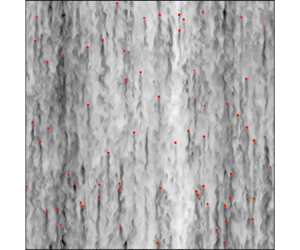Published online by Cambridge University Press: 07 September 2021

We present a numerical method for simulating the flow induced by bubbles rising at large Reynolds number. This method is useful to simulate configurations of large dimensions involving a great number of bubbles. The action that each bubble exerts on the liquid is modelled as a volume source of momentum distributed over a few mesh-grid elements. The flow in the vicinity of the bubbles is thus not finely resolved. The bubbles are treated as Lagrangian particles that move under the influence of the hydrodynamic force exerted by the liquid. The determination of this force on a given bubble requires knowledge of the liquid flow that is undisturbed by this bubble. A model is developed to accurately estimate this disturbance for large-Reynolds-number objects and get rid of any spurious self-induced effect. Thanks to that, a homogeneous swarm of rising bubbles is simulated. Comparisons with experiments show a good agreement with the flow scales larger than the bubbles, which turn out to be controlled by the interactions between bubble wakes and rather independent of unresolved smaller scales. This method can be used to study the coupling between bubble-induced agitation and large-scale motions, such as those produced in industrial bubble columns.